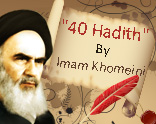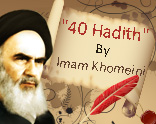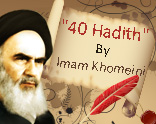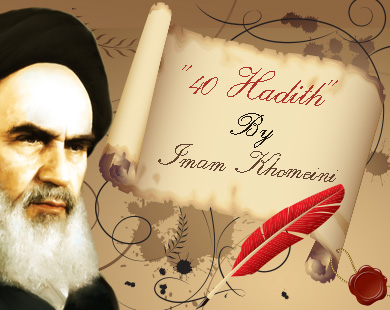... Muhammad ibn Ya'qub (al-Kulayni), from `Ali ibn Ibrahim, from his father,
from al-Nawfali, from al-Sakuni, who reports on the authority of Abu `Abd Allah
(al-Imam al-Sadiq) (A.S.) that the Prophet (pbuh&hh) said: "Whosoever
possesses in his heart 'asabiyyah (prejudice in any of its forms such as
tribalism, racism, nationalism) even to the extent of a mustard seed, God will
raise him on the Day of Resurrection with the (pagan) Beduins of the Jahiliyyah
(the pre-Islamic era).'1
Exposition:
Although now khardal is current in modern Persian for the mustard seed, the word
for it in old Persian was espandan. It is said that the mustard seed has many
medicinal uses and is also used for making candles. As to the word `asabiyyah it
is the characteristic of the person who supports his kinsmen and relatives even
for a wrong and unjust cause. `Usbah refers to paternal relatives, as they are
more likely to be those among whom one is surrounded (`asaba: to wrap around)
and those from whom one derives strength (`asaba means, also, to bind). `Asabiyyah
and ta'assub in general give the sense of favouring and defending. So much for
the lexical meaning.
As to its nature, I believe that `asabiyyah is an inner psychic quality which is
manifested in patronizing and defending one's kindred and those with whom one
has some kind of affinity or relation, whether it be religious creed or
ideology, or whether it be soil or home. The affinity may also be similarity of
profession or the relationship of teacher and pupil, or something else. It is a
moral vice and an abominable trait which itself begets many more moral and
behavioural deviations and vices as well. In itself a condemnable quality, it
may take the form of defence of truth or religion, but in reality it is not
aimed to defend a just and truthful cause but for extending one's own influence
or that of one's co-religionists and allies.
As to the defence of truth, the efforts to disseminate it and to posit something
which is true, are either not `asabiyyah, or, if they are, represent a
commendable kind of it. The criterion lies in the distinct aims and purposes,
and to the extent to which it involves selfish and diabolical ends or serves
just and godly purposes. In other words, when a man supports his kinsmen and
friends, if he does so purely for the sake of upholding justice and defeating
injustice, this kind of `asabiyyah is commendable and praiseworthy; because
supporting justice and truth is among the sublimest of human qualities, being
one of the attributes of the prophets of God (A.S.) and His awliya'. Its sign is
that one should support the party which is on the side of truth and justice,
even though it may consist of one's enemies. Such a person is a defender and
lover of truth; he will be counted among the champions of human sublimity, a
rightful citizen of the ideal human society, and a wholesome member of society
whose presence exerts a reforming influence on the evils of the public. And if
one's selfish and tribal instincts arouse him to defend and patronize the vices
and wrongs of his kinsmen and associates, he is inflicted with the vice of `asabiyyah;
he is a corrupt member of society, who corrupts it by confusing vice with
virtue, and stands with the Beduins of the Jahiliyyah, who were a group of
nomadic Arabs who inhabited the desert before the advent of Islam, in an era of
prevalence of darkness and ignorance. This vice had taken hold of them to the
highest degree, and among Arabs in general, who are guided by the light of
guidance (through Islam) this vice is more than in any other nation. According
to a tradition reported from Imam `Ali (A.S.), God Almighty will punish six
groups of people for six kinds of sins: He will punish the Arabs for `asabiyyah,
the peasants for pride, the rulers for oppression, the jurisprudents for
jealousy, the merchants for dishonesty, and the villagers for ignorance.
The Evils of `asabiyyah:
From traditions narrated from the Household of the Prophet (pbut) it may be
inferred that the vice of `asabiyyah is one of the fatal sins, which results in
an evil life in the Hereafter and drives man out from the precincts of faith,
being one of the abominable traits of the Devil:
[In al-Kafi, through a chain of authentic narrators], it is reported from Abu `Abd
Allah (al-Imam al-Sadiq (A.S.) that the Prophet (pbuh&hh) said: "The one who
exerts `asabiyyah or the one on whose behalf it is exerted, the tie of faith is
taken off his neck."2
That is, such a man is deprived of faith and abandoned. As to the person in
whose interest `asabiyyah is exerted, perhaps he is also included in the hadith
due to his compliance to the behaviour of the one exerting `asabiyyah and hence
made to share his lot jointly. And it is stated in hadith that whosoever
approves of the action of a certain group is counted amongst it. However, if he
does not approve of it and detests it, this tradition would not apply to him.
And:
Al-'Imam al-Sadiq (A.S.) is reported to have said: "Whosoever practises `asabiyyah
(against someone), God shall wrap around him (`asabahu) a fold (`isabah) of
Fire."3
Al-'Imam 'Ali ibn al-Husayn (A.S.) is reported to have said: No hamiyyah
shall ever enter Paradise, except the hamiyyah of Hamzah ibn `Abd al-Muttalib,
which was (expressed) at the time when he became a Muslim on account of his
anger in support of the Prophet (pbuh&hh)."4
The episode of Hamzah's conversion to Islam has been reported variously, and is
not relevant to our discussion. In any case, it is obvious that faith-which is
the invisible holy gift of God to His special servants, the sincere devotees of
His Court, and the champions of His love-is contrary to a quality that
disregards truth and reality and tramples truthfulness and uprightness under its
feet. Of course, if the mirror of the heart be covered with the dust of
self-love and the love of the kindred and improper and blind `asabiyyah, the
light of faith will not shine in it; it will not be fit to be the hidden abode
of the Most High. The person whose heart has been the mirror for the light of
faith and gnosis, the one whose neck has been tied in the firm and unbreakable
rope of faith, the one who is the hostage of reality and Divine knowledge, the
one who remains wedded to the religious precepts and confined to rational
principles and laws, the one who derives all his impulses from reason and Divine
Law-no force of customs, ways, or familiar things can cause him to quiver or
deviate from the right path. One can profess Islam and claim iman (belief) only
when he is submissive to truth and humble in front of it, and when he deems his
own aims and purposes, no matter however great they may be, as trivial and
transitory, before the aims and purposes of his Lord and Provider; he
annihilates his own will in the Will of his real Lord. Of necessity, such a
person will be free from all traces of ignorant `asabiyyah; his face will be
turned towards reality, and thick curtains of ignorance and `asabiyyah would not
obstruct his vision. When called to administer justice and utter the word of
truth, he puts a firm foot on the head of all associations and ties, sacrificing
all ties of kinship and customary affinities at the altar of the aims and
objectives of his Lord. If there is a clash between the Islamic `asabiyyah and
the `asabiyyah of the Jahiliyyah, he gives precedence to his Islamic `asabiyyah
and his `asabiyyah for truth. An enlightened human being knows that all the `asabiyyahs
and all associations and relationships are merely transitory accidents and are
perishable. The only relationship that is permanent and lasting and the only `asabiyyah
that is true, is the relationship between the Creator and the created being, and
is essential and unbreakable; it is firmer, higher, and prior to all the ties of
lineage and alliance.
A Prophetic Tradition:
The Prophet of God (pbuh&hh) is reported to have said:
All the ties of lineage and affinity will be broken on the Day of
Resurrection except the ties of my lineage and affinity.
It is obvious that the ties of lineage and affinity of that holy personage are
spiritual and lasting, and free from all pre-Islamic biases and `asabiyyahs. In
fact the spiritual ties of lineage will be more vivid in that world and its
merits more conspicuous. On the other hand, the physical and terrestrial
relationships that are rooted in human habits and customs are very weak and
fragile and are broken easily. None of them have any worth and value whatsoever
in the next world, except those relationships that are established according to
the Divine celestial system and under the auspices of the precepts of the Law
and dictates of reason: only they are unbreakable and unseverable.
The Otherworldly Form of `asabiyyah:
It was mentioned in some of the ahadith discussed previously that the criteria
of the otherworldly forms, which human traits will acquire in the Barzakh and on
the Day of Resurrection, are the habits and qualities and their strength. That
world is the domain of the dominance of the spirit and the subservience of the
body. It is possible that men should be raised in the forms of animals or satans.
The present tradition which we are expounding, and which maintains that `the
person who possesses in his heart `asabiyyah even to the extent of a mustard
seed, God Almighty will resurrect him on the Day of Judgement with the Beduins
of the pre-Islamic era', may also refer to the above-mentioned point. The man
possessing this vice, after being transferred to the other world may behold
himself as one of the pre Islamic heathen Beduins, who neither had faith in God
Almighty nor believed in prophets and prophethood. Whatever the inner and outer
form of that tribe had been, he will find himself when resurrected as one of
them. Perhaps he will himself not understand as to why such a thing would happen
to him, while in the world he professed the true religion of God and claimed to
be an adherent of the faith of the Holy Prophet (pbuh&hh). It is mentioned in a
tradition that the inhabitants of Hell will not be able to remember the name of
the Prophet (pbuh&hh), and, as such, would not be able to introduce themselves
as his followers, unless God Almighty resolves on their deliverance. And since,
according to some of the traditions, the trait of `asabiyyah is one of the
attributes of Satan, may be the heathen Beduins of the pre-Islamic era, as well
as the individuals possessing the primitive habit of `asabiyyah would be
resurrected in the form of Satan:
(According to a reliable hadith of al-Kafi), Abu `Abd Allah (al-'Imam al Sadiq)
(A.S.) is reported to have said: "Verily, the angels counted Satan as one of
themselves, and it was in the knowledge of God that he was not of them; then he
spoke out whatever was inside him, out of hamiyyah and anger, and said (to God):
'Thou createdst me of fire, and him (Adam) Thou didst create of clay."5
Thus my dear, you should know that this vice belongs to Satan and is a fallacy
inspired in you by that accursed being based on false analogical inference. He
committed the mistake because of the dense veils of `asabiyyah. This veil
conceals all realities from the sight, or rather shows all one's vices as
virtues and the virtues of others as vices. And it is obvious as to where the
deeds of the person who beholds things in a contrary perspective would lead him.
Besides being itself a source of human ruin and doom, it gives rise to a number
of moral, spiritual and behavioural villainies, the description of which would
be cumbersome. As such, a wise person, who understands these villainies as the
products of this vice and confirms the testimony of the truthful Holy Prophet (pbuh&hh)-whose
truthfulness has been confirmed by God-and the Members of his Household (A.S.),
who all state that this trait leads man to destruction and makes him an
inhabitant of the Fire, should seriously consider about curing himself, and if,
God forbid, there is the slightest speck of this vice in his heart, equal to the
size of a mustard seed, he should purge it, so that he may be thoroughly
purified before leaving this world and being transferred to the next. He should
be free from this vice at the hour of his death, so as to put his feet into the
other world with a pure soul. He should keep in his mind that he has fiery
little time and very limited opportunity; for he does not know as to when he
will have to depart from this world.
A Colloquy With the Self:
O my vicious self! Perhaps your death may approach while you are still busy in
writing these pages, and transfer you with all your moral vices to the next
world from where there is no return. And O you dear reader of these pages, draw
a lesson from the life of this writer who may be today under the ground and in
the other world, a victim of his ugly acts and wicked behaviour. As long as he
was given opportunity, he spent the precious days of his life in vain pursuit of
lusts and desires and squandered that gift of God with vain profligacy. Yet you
must be careful as you too shall be in a condition similar to his, and you don't
know when. Perhaps as you are reading these pages, the opportunity may slip if
you go on procrastinating. O brother! Do not put off these matters; they are not
to be postponed. Remember, how many hail and hearty people have suddenly been
snatched away by the claws of death, and we have no knowledge about what awaited
them in the Hereafter.
Therefore, do not let the chance slip and consider every second as precious; for
the matter matters a lot and the journey is a perilous one. If you lose the
opportunity of doing something in this world, which is the field whose harvest
is the Hereafter, you will not be able to do anything any more and you will not
be able to straighten your crookedness. There will be nothing left except
regret, perplexity, chastisement, and degradation. The men of God were never at
ease even for a little while; they were never oblivious of the perilous and
hazardous journey ahead. The condition of the fourth Imam 'Ali ibn al-Husayn (A.S.)
was amazing. The laments of Amir al-Mu'minin Imam `Ali (A.S.) are stunning. What
is the matter with us that we are so negligent? Who has given us assurance
except the Devil, who makes us put off our actions for tomorrow and wants to
bulge the number of his followers and companions by making us share his
attributes? Doesn't he, in this way, want to include us in his company so that
we may be resurrected in his retinue? The accursed creature always diminishes
the importance and seriousness of the matters of the Hereafter in our eyes, and
makes us oblivious of the remembrance of God and obedience to His commands by
means of the promises of His mercy and the intercession of the intercessors.
But, alas, such temptations have no truth and belong to the deceitful
paraphernalia of the snares of that accursed creature. Of course, even at
present, you are immersed in the mercy and compassion of God, rejoicing in the
gifts of sound health and well-being, life and safety, guidance and reason,
opportunity and directions for the reformation of the soul and other such myriad
favours. Yet you are not drawing benefit from these favours in this world by
complacently following the Devil. Beware if you fail to draw any benefit from
God's mercy in this world, in the next world also you will not be able to
benefit from the infinite mercy of God and the intercession of the intercessors.
The guidance provided by them is this-worldly reflection of the intercession of
the intercessors in the next world and the otherworldly reflection of the
guidance provided by them here is intercession. But if you cannot benefit from
the guidance, remember that you will not be able to receive the benefit of
intercession either; it depends on the guidance you utilize here. The
intercession of the Holy Prophet (pbuh&hh) is general and universal; however,
like the blessings of God, the receiver must have capacity to receive it. If,
God forbid, Satan robs you of the faculty of faith, you will be incapable and
unworthy of receiving Divine mercy and the intercession of the intercessors.
Yes, God's bounties in the two worlds are plenty and His mercy unlimited; but if
you really seek His mercy, then why do you neglect His unceasing bounties in
this world that are like seeds of His favours in the other? All the prophets of
God and the awliya' have invited you to the Divine feast, yet you turn away and
you do not accept it on account of the evil insinuations of the Devil. You
sacrificed the muhkamat (the firm verses) of the Book of God, the mutawatirat of
the prophets and awliya', the compelling rational arguments of the wise, and the
definite proofs of the hukama' for the fiendish fantasies and fancies of your
own. Woe to you and me for our state of neglectfulness, blindness, deafness, and
ignorance.
On the `asabiyyahs of the Intellectuals:
One of the types of `asabiyyahs is stubbornness in intellectual matters and the
habit of supporting the statements and ideas of one's own or that of one's
teacher or spiritual master not for the sake of defending truth and refuting
falsehood. It is obvious that such a kind of `asabiyyah is worse and more
improper in some ways than other types of `asabiyyah. This, because a scholar
and an intellectual ought to be an instructor of mankind, scholarship being a
branch of the tree of prophethood and wilayah itself. He should be aware of the
evil effects and bad consequences of moral vices. If, God forbid, he himself
possesses the vice of `asabiyyah and attaches to himself the mean attributes of
Satan, he will have scarcely anything to offer in self-defence and will be taken
to task severely. The person who poses himself as a guiding beacon of light, a
source of enlightenment in the assembly of mankind, as a guide to the path of
felicity, and as one who is charged with the duty of guiding men on the path of
Hereafter, if, God forbid, he does not remain faithful to his words and his
inner being contradicts his outward appearance, he will be grouped with the
hypocrites and the pretentious. He will be branded as an evil scholar, a man of
knowledge devoid of good deeds, whose retribution is a painful chastisement, as
described by God Almighty in the Holy Quran:
﴾... Wretched is the likeness of those who deny the revelations of
Allah. And Allah guideth not wrongdoing folk. (62:5)﴿
Hence it is essential for scholars to retain their integrity and to keep
themselves free from such vices, so that having corrected themselves they may be
able to reform their society through a truly effective preaching and
exhortations that can penetrate the hearts and minds. The corruption of a
scholar can lead to the corruption of a nation. And it is obvious that the vice
which generates multiple vices and the transgression which begets other
transgressions is worse and greater than an isolated, non-contagious vice in the
eyes of the Almighty.
Another hideous aspect of this vice in intellectuals is the atrocity done to
knowledge itself; as this `asabiyyah on the part of an intellectual amounts to
the abuse of knowledge and disrespect to it. The one who is entrusted with this
valuable trust and enrobed in its precious robes, it is his duty to preserve its
sanctity and deliver it safely to its owner. And if one is guilty of the `asabiyyah
of pagan Beduins with regard to it, he is of course guilty of the sin of breach
of trust, an injustice and a major sin and offense. The other ugly side of this
vice is the wrong done to the other side. Because, the other side that
participates in intellectual discourses also comprises of scholars. He too
enjoys a sanctity which it is obligatory to observe and to safeguard his honour.
Insulting him will be synonymous with violating Divine sanctities, and it is a
great sin. Sometimes, senseless `asabiyyahs make one insult scholars. I seek
refuge in God from this major offense.
Yet another aspect of `asabiyyah relates to the person in whose favour `asabiyyah
is exercised, who may be one's instructor and tutor. He may be forced to disown
his pupil, because all the great masters and saints-karram Allah wujuhahum are
naturally attracted towards truth and justice and are abhorrent to untruth and
injustice. They detest him who violates justice and gives currency to falsehood
through his acts of `asabiyyah. Of course, the harms of spiritual disownment are
greater than the harms of parental disownment, for spiritual fatherhood is above
physical parenthood. Thus it is incumbent upon scholars-may God increase their
station and honour-to protect themselves from all moral and behavioural vices,
to adorn themselves with the ornaments of good deeds and moral virtues, and not
to be unmindful of the duties of the holy office which the Most High has
bestowed on them, the failure to do which may bring ruin whose extent is not
known to any one except God Almighty alone. Wassalam.
* Book: Forty Hadith (An Exposition on 40 ahadith narrated through the
Prophet (pbuhh&hh) and his Ahl al-Bayt (a.s.)).By Imam Ruhullah al-Musawi al-Khumayni.
Translated by: Mahliqa Qara'i (late) and Ali Quli Qara'i
1- Al-Kulayni, Usul
al-Kafi (Intisharat `Ilmiyyah Islamiyyah, Tehran), vol. III (Arabic text with
Persian translation by Sayyid Jawad Mustafawi), p. 419.
2- Ibid.
3- Ibid., p. 420.
4- Ibid.
5- Ibid.




















